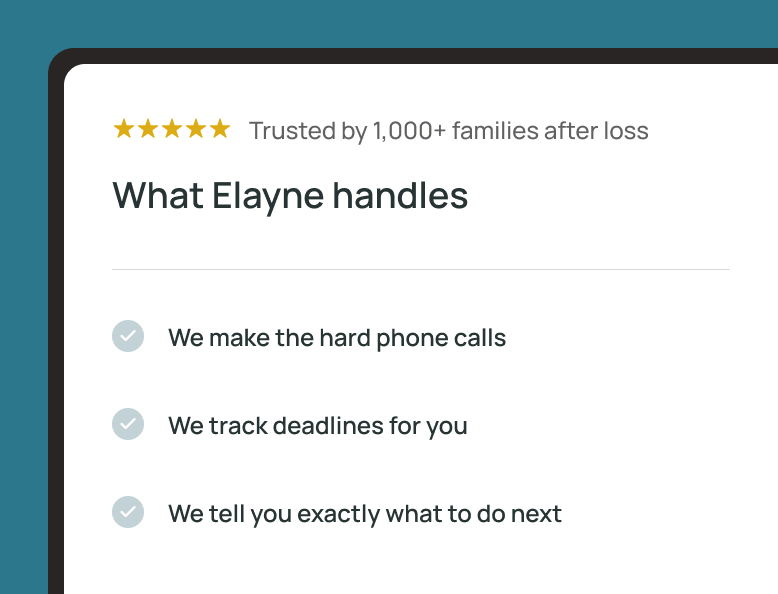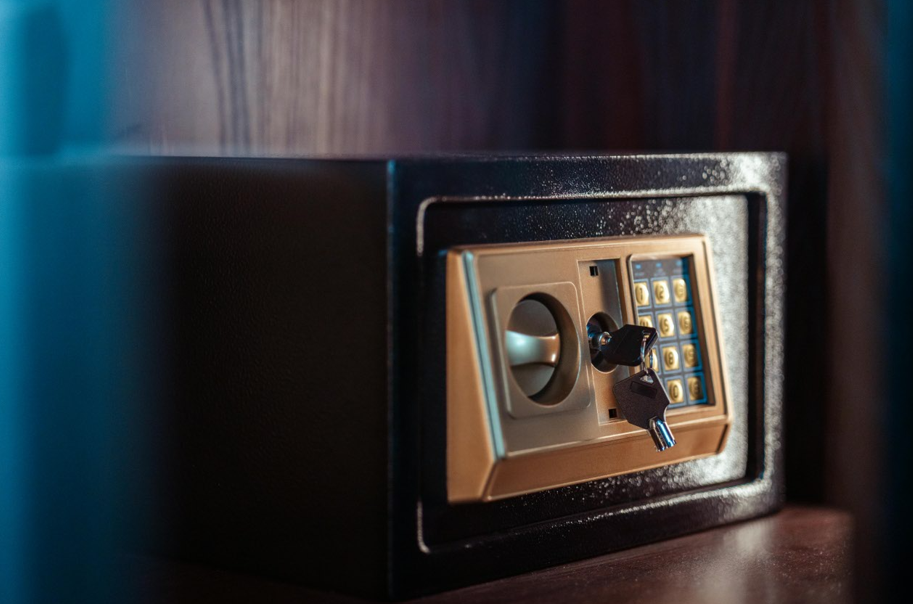When a loved one passes away, it can feel like the world has turned upside down. But, even in that moment, there are still tasks that need immediate attention.
Between planning services and settling accounts, there’s one step in particular that’s easy to miss: protecting your loved one’s identity.
Identity theft after death is more common—and dangerous—than many people realize. Public records, online announcements, and delays in official systems can leave personal information exposed. And when fraud happens, it can be costly, stressful and hard to fix.
Through our work at Elayne in helping family members settle affairs after the death of a loved one, we unfortunately come across this all too often.
Here’s what puts sensitive information at risk, what it can cost, and how to prevent it.
Why Identity Theft Happens After Death
After someone dies, their personal information suddenly becomes more visible.
Obituaries, memorial posts, and public records can reveal full names, birthdates, addresses, and family relationships—details that identity thieves look for. Even if you share carefully, once a death certificate is issued, certain information becomes part of the public record, giving bad actors another way in.
At the same time, the systems designed to update a person's status after death—financial institutions, government agencies, credit bureaus—often move slowly.
Within that gap, fraudsters take advantage.
They can use a deceased person's identity to:
- Open credit lines
- File tax returns
- Claim benefits
- Take out loans
And because the victim can’t monitor their own accounts anymore, the fraud can continue unnoticed for weeks or months.
Today’s technology has only made this easier. AI tools can create fake IDs, generate forged documents, and impersonate voices, making it harder for banks and other institutions to detect when something isn’t right.
What’s at Stake for Families: The Cost of Identity Theft After Death
Identity theft after death isn’t just about cleaning up fraudulent charges. It can have ripple effects that drag out the process of settling an estate, increase legal costs, and even affect survivors’ financial standing.
Some of the most serious risks include:
- Financial loss. Fraudulent charges on credit cards, unauthorized withdrawals from bank accounts, theft of retirement savings or life insurance benefits.
- Delays in settling the estate. If debts are opened in the deceased’s name after death, it can complicate probate and distribution of assets.
- Credit damage tied to survivors. In cases where accounts are jointly held, fraudulent activity can affect a surviving spouse or family member’s credit.
Estimates suggest that many victims of identity theft experience losses in the thousands of dollars, but it can be much higher depending on the accounts involved—we’ve even seen cases of it surpassing hundreds of thousands of dollars.
These challenges come at a time when families are already emotionally vulnerable. That’s why early, preventive steps are so important.
How to Protect a Loved One’s Identity After Death
If you have authority to act on your loved one’s behalf, you don’t need to close every account on day one. But moving fast on a few key fronts can make all the difference.
1. Secure Their Financial Accounts
The most urgent step is locking down financial access.
After the death of a loved one, we recommend you take the following steps immediately to protect their identity:
- Notifying banks, credit card companies, mortgage lenders, and investment firms. Provide a copy of the death certificate and request that accounts be closed, frozen, or flagged as belonging to a deceased individual.
- Reporting the death to the major credit bureaus. Contact Equifax, Experian, and TransUnion. Ask them to place a "deceased alert" on your loved one’s credit file to help prevent new accounts from being opened.
- Requesting a credit freeze. Some bureaus allow you to freeze the deceased’s credit file, adding another layer of protection.
- Canceling automatic payments and subscriptions. This helps prevent account misuse and unauthorized charges.
2. Protect Personal Information
Beyond finances, it’s important to control access to your loved one’s personal information. Focus on:
- Limiting what you share publicly. When writing an obituary or posting online, avoid sensitive details like full birth dates, home addresses, or maiden names.
- Forwarding their mail to a trusted family member. This ensures that important documents, bills, or financial statements do not sit unattended and vulnerable.
- Shut down or memorialize online accounts. Social media profiles, email accounts, and cloud services should be closed or converted to memorial status to prevent unauthorized access.
3. Keep monitoring
Even after taking action, it’s a good idea to stay vigilant in the months that follow. Make sure to:
- Check credit reports regularly. Review your loved one’s reports every few months during the first year after their passing. Look for unfamiliar accounts, new credit inquiries, or anything out of the ordinary.
- Act quickly if you spot anything suspicious. Request a full credit freeze, notify financial institutions, and report the fraud to the Federal Trade Commission.
How Elayne Can Help Protect a Loved One's Identity After Death
At Elayne, we move quickly to prevent fraud. Our approach is personal, practical, and built to ease the burden during an already difficult time.
Here’s what that support looks like in practice:
- A personalized roadmap for your family. We walk you through each step, starting with the ones that protect personal information and reduce the risk of exposure.
- We make the hard calls for you. We contact banks, credit bureaus, and service providers on your behalf to close accounts, freeze credit, and secure anything that might be vulnerable.
- Protection for both legacy and loved ones. We help prevent stolen funds and account misuse, and we also work to protect surviving family members from credit damage or identity theft.
A Final Word on Preventing Identity Theft After Death
Grief is never simple, and neither are the responsibilities that follow.
But taking a few steps now—securing finances, guarding personal information, and monitoring for fraud—can protect everything your loved one has worked so hard to build, and shield your family from unnecessary hardship.
Preserving someone’s legacy is an act of love, and shouldn’t have to feel like a source of worry. It’s a way to honor what mattered most to them, and carry their memory forward with care.
*Disclaimer: This article is for informational purposes only and does not provide legal, medical, financial, or tax advice. Please consult with a licensed professional to address your specific situation.















































